The email from a colleague and friend in Lubero territory, Democratic Republic of Congo, came in about four days ago and it was just a matter of time before another round of violence would occur away from the eyes of western media.
The security situation in the area is bad. Monuc (United Nations Mission in Congo) has signaled the presence of FDLR there and they may attack any time.
On April 28 a press release and graphic photos confirming the violence came in from Human Rights Watch (HRW).
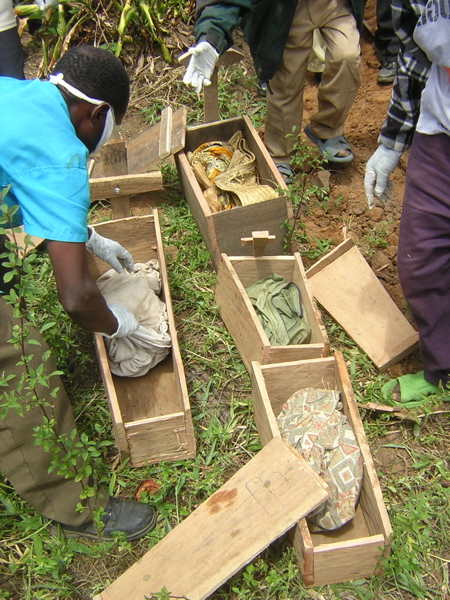
Image: © 2009 Human Rights Watch
The father of three young boys, (ages 3, 4, and 6) burned to death in their home, said:
The FDLR came and circled my house. When we tried to leave, they said, "You can't leave or we'll kill you." I was able to move out a bit and get some distance from the house, but my three young boys were still inside, sleeping on a single bed. Then I saw the FDLR combatants light a fire directly on my house and my three boys burned to death.
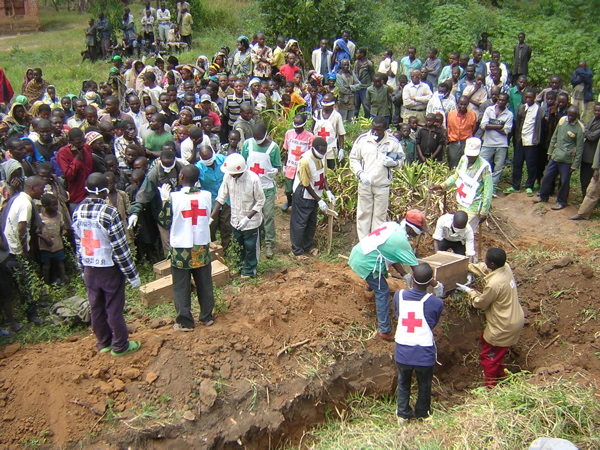
Image: © 2009 Human Rights Watch
The father of a 2-year-old girl burned to death in their home: said
The FDLR circled our house and told us to leave. My wife, three of my children, and I rushed to get out, but our two-year-old daughter did not make it out in time. They set fire to the house immediately, and my daughter and all our belongings were burned to the ground.
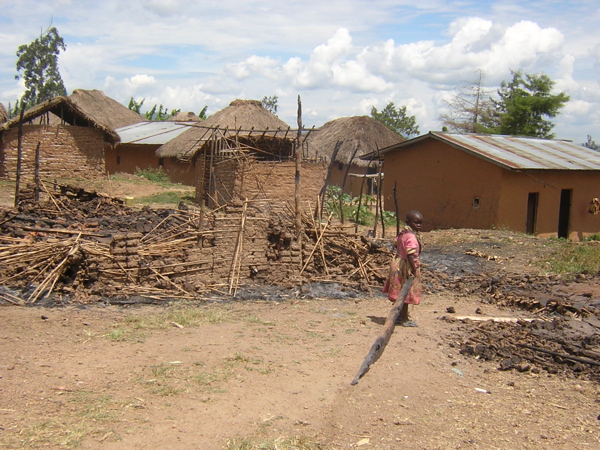
Image: © 2009 Human Rights Watch
Two Rwandan militia groups, the Democratic Forces for the Liberation of Rwanda (FDLR) and the Rally for Unity and Democracy (RUD), in addition to the regular Congolese army, have routed 100,000 civilians in the eastern Democratic Republic of Congo (DRC) from their homes. The FDLR consists of members of the Hutu Interahamwe that carried out the 1994 Rwandan genocide in which up to one million Tutsis and moderate Hutus were brutally murdered in 100 days. The RUD is a splinter group of the FDLR. When the Tutsi-led Rwandan Patriotic Front (RPF) ended the genocide in July 1994 by taking the capitol city of Kigali, the genocidaires escaped to eastern Congo. Displaced civilians in Lubero territory "desperately need protection from further attacks by Rwandan militias and Congolese forces," HRW said in an urgent press release. 250,000 have fled fighting since January. 1.2 million are displaced and living in unspeakable conditions in IDP camps.
"Civilians fleeing for their lives are stuck between a rock and a hard place, and are unsure where they can find safety," said Anneke Van Woudenberg, senior Africa researcher at Human Rights Watch. "They urgently need protection and humanitarian assistance, but there are too few peacekeepers and UN agencies to help them."
The villages and towns of Luofo, Kayna, Kirumba, Kanyabayonga, and Kasegbe provided temporaty shelter from the armed conflict, but were subsequently attacked by the Rwandan militias. At least 35 civilians have been killed, 91 women and girls raped, and hundreds of homes burned to the ground since the operations began. Both Rwandan fighters and Congolese army soldiers (FARDC) are responsible for the abuses, with each accusing civilians of supporting the other side.
HRW has released testimony and photos documenting the following incident:
In an attack on April 17, five children were burned to death when Rwandan militias attacked Luofo village, where more than 12,000 displaced people had sought shelter. The attack appeared to be a reprisal against the population in response to the government's military operations. Local authorities said that two days after the attack they received a letter from one RUD militia commander stating that the people of Luofo would "continue to be burned and buried."
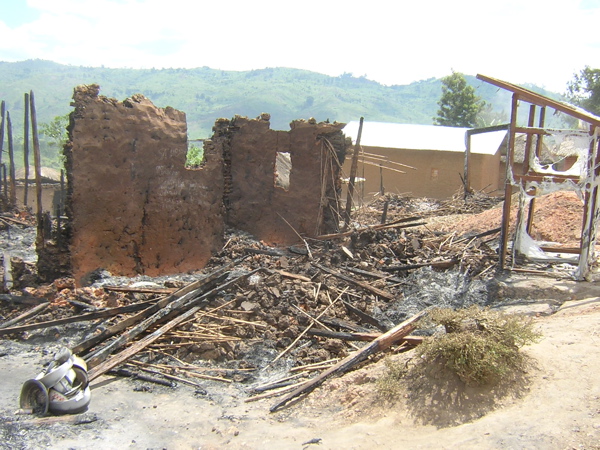
Image: © 2009 Human Rights Watch
According to HRW, FARDC soldiers responsible for protecting their fellow citizens "have themselves been involved in many of the abuses. Of the 91 women and girls known to have been victims of sexual violence in recent months, at least 56 reported they were raped by government soldiers, who often accused their victims of being the wives of FDLR combatants." Government troops, ill-disciplined and unpaid, have burned and pillaged hundreds of homes, arbitrarily arrested civilians, stolen their crops, and looted their property, HRW says, while repeating its call on the Rwandan militias to stop deliberate attacks on civilians, "which constitute war crimes."
In a separate report issued two days ago, HRW questioned the Congolese government's promotion of war criminals to high ranks within its military.
Human Rights Watch highlighted several cases in which military commanders in the Democratic Republic of Congo who are well-known for their use of child soldiers are now in government or senior military positions.
In Congo, Jean-Pierre Biyoyo was recently appointed a colonel in the Congolese army despite being convicted by a military court in March 2006 of recruiting children as soldiers while a leader of the Mudundu 40 militia. He was sentenced to five years in prison, but escaped three months later, in June 2006.
Bosco Ntaganda was made a general in the Congolese army in January, despite being wanted on an arrest warrant by the International Criminal Court (ICC) for the war crime of enlisting child soldiers and using them in hostilities. In addition to the ICC charges, Ntaganda has been accused of commanding troops that massacred 150 civilians at Kiwanja in North Kivu province in November 2008.
In addition, Radhika Coomaraswamy, Special Representative of the UN Secretary General for children and armed conflict, has accused soldiers, including the regular Congolese Army, of heinous abuses against children in Goma and Masisi in North Kivu, and Dungu in Orientale Province. She presented her findings and remarks at a press conference in Kinshasa at thee end of an eight-day fact-finding visit to DRC last week. The Special Representative said that 48% of victims of sexual abuse in the DRC are minors, and that 67% of those responsible are men in uniform.
Recent secret agreements between Paul Kagame of Rwanda and Joseph Kabila of DRC resulted in the arrest or "detention" of Tutsi rebel leader Laurent Nkunda of the CNDP (Congress for the Defense of the People). Nkunda was arrested and detained by Rwandan military forces and is being held in Gisenyi, Rwanda. The CNDP maintains that Nkunda protected Congolese people of all ethnicities who lived in the territories under his control, especially against atrocities and violence perpetrated by FARDC and the FDLR. The arrest of Nkunda was an action of apparent betrayal by the government of Rwanda, which had supplied him with aid and logistics. The unprecedented joint military operation between the governments of Rwanda and DRC was touted as a solution to the violence, but the opposite seems to have occurred. See our previous Huffington Post Report. During January and February, the FDLR were temporarily held at bay and pushed out of their strategic positions. However, following the withdrawal of Rwandan forces after February 24, the FDLR reoccupied its former positions. A report indicated mass atrocities and the slaughter of over 100 civilians by FDLR forces at that time.
The attack on Luofo came only five days after the UN peacekeeping force withdrew its temporary operating base from the village following the arrival of Congolese army soldiers, HRW reports.
The UN has fewer than 400 peacekeepers in Lubero territory, in two bases at Kanyabayonga and Lubero, plus two recently established temporary bases at Luofo and Kirumba. Rwandan militias have threatened to attack next the neighboring towns of Kirumba and Kayna, which harbor over 35,000 displaced people.
The 3,000 additional peacekeepers authorized by the UN Security Council in November 2008 have still not arrived in eastern Congo, despite promises from council members that they would urge a rapid deployment. Helicopters and intelligence support, desperately needed by the mission, have also not materialized. On April 9 in New York, Alan Doss, the head of the UN peacekeeping force, warned the Security Council that, without such assets, MONUC's "capacity to respond quickly to emerging threats and protect civilians would be curtailed."
UN peacekeepers are involved in the joint military operations with Congolese government forces against Rwandan militias in what is known as Operation Kimia II. But peacekeepers have so far been unsuccessful in restraining government soldiers from committing abuses against civilians.
A source deep within the conflict area reports:
The situation remains very difficult because there are 28,000 troops in North Kivu. A third of them are integrated CNDP, and there are still many armed groups that have not integrated the army. Insecurity is still very high, especially in Masisi and Lubero where the FDLR are operating, but for the ordinary people of North Kivu, I would say that the situation has improved simply because the fighting has stopped and people have gone back to their fields, and are able to rebuild their lives, and send their children to school. Only when the armed forces in North Kivu are significantly reduced will things improve for the rural populations.
Unfortunately, too much blood has been spilt here for there to be a right side and a wrong side. My advice would be to be cautious about anybody's political spin, government or CNDP. But I still think that there is hope in those few incredibly courageous ordinary Congolese who keep faith and keep trying to rebuild their country. The only way forward is to try to provide them with what support we can.
In an echo of this sentiment, "More UN peacekeepers, improved protection, and increased humanitarian aid are desperately needed to help those at risk of further attacks in Lubero territory," said Van Woudenberg. "The cries of Congolese people in distress should not be ignored.
Tens of thousands of people displaced from their homes are struggling to survive. Unable to harvest their crops, they are continually hungry and dependent on the limited help provided by already-overburdened host families. Few UN and humanitarian agencies are working in Lubero territory to provide the much-needed assistance, due to limited donor funds and lack of security to give them access to the people in need, HRW says.
The total cost in human lives of this conflict is conservatively estimated at between 5 and 6 million people.
While the swine flu story continues to dominate this news cycle, 100,000 people are known to be in immediate danger in eastern Congo. Our short attention spans return to this ongoing humanitarian crisis only when the natural disaster "crisis" stories lose their punch.
At an Education Without Borders Conference in Abu Dhabi, Shi Ming Wong of Harvard University presented a paper on media bias in covering natural disasters.
I would suggest that in order to attract as much viewership as possible, media organizations tend to pay more attention to "abrupt" disasters...compared to long-running humanitarian crises...viewers and readers have short attention spans, thus it is difficult to keep long-running humanitarian disasters "fresh" and "original" to them.
This may be true, but to the grieving parents who saw their children burned to death in eastern Congo this month, a short attention span would be a blessing compared to the life-long grief these mothers and fathers will suffer.
This writer literally pulled over to the side of the road and checked into a hotel to write this up when the release came in on my Blackberry. I am somewhere in the heart of Mississippi and as I write this, I cannot help but remember the admonition I received from a thoughtful friend regarding a recent post I had here on Huff regarding the southland. "Please remember that Mississippi is soaked in blood," my valued friend told me. I guess I can't do much about Mississippi, racism and slavery, but if I keep pounding these stories out about Congo, perhaps I can urge readers to remember how Africa is now soaked in blood and we do have the power to influence change.
The humanitarian disaster in eastern Congo can be stopped by the application of international will. For us to turn our backs on the Congolese people is a moral failing with profound consequences for humanity. If it is too difficult to think of 6 million or 100,000, please think about this little guy. I don't even know if he is still alive. Chances are, he is not.
Image: IDP camp near Goma ( please USE this photo as you see fit)
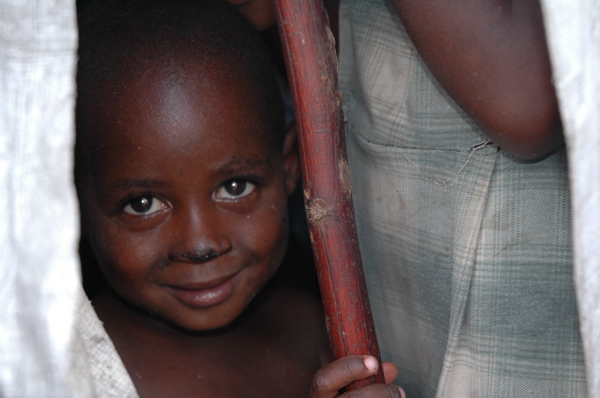
For more Human Rights Watch reporting on Democratic Republic of Congo, please visit this site.